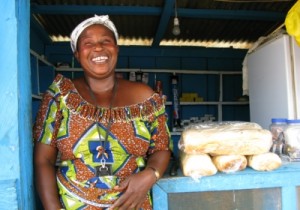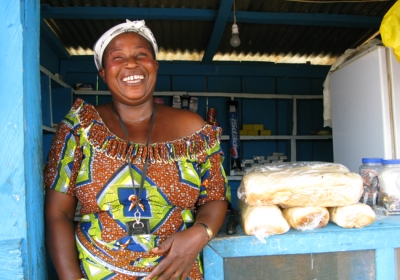 Malawi is a small country in southern Africa, neighboured by Mozambique, Zambia and Tanzania. The women living in this country have experienced great challenges in gaining access to political and leadership positions. Since Malawi attained democracy in 1994, it has achieved some gains in women’s participation the political domain, particularly an increase in women’s parliamentary representation.(2) However, the country compares poorly with many of its African neighbours, in terms of development of gender equality. Patrimonial rhetoric remains prevalent (3) and constrains Malawian women who seek to engage in political and governance spheres. Spaces for women to participate and make their voices heard are very limited. “While there are currently more women in parliamentary seats than ever before in Malawi’s history, the overall representation of women in key decision-making positions in Malawi remains low,”(4) Rebecca Tiessen wrote in 2008.
Malawi is a small country in southern Africa, neighboured by Mozambique, Zambia and Tanzania. The women living in this country have experienced great challenges in gaining access to political and leadership positions. Since Malawi attained democracy in 1994, it has achieved some gains in women’s participation the political domain, particularly an increase in women’s parliamentary representation.(2) However, the country compares poorly with many of its African neighbours, in terms of development of gender equality. Patrimonial rhetoric remains prevalent (3) and constrains Malawian women who seek to engage in political and governance spheres. Spaces for women to participate and make their voices heard are very limited. “While there are currently more women in parliamentary seats than ever before in Malawi’s history, the overall representation of women in key decision-making positions in Malawi remains low,”(4) Rebecca Tiessen wrote in 2008.
This CAI paper focuses on Malawian women’s work to realise gender equality. Political activists, non-governmental organisations (NGOs) and feminist groups have joined forces with Government to promote equitable representation of women and to increase their inclusion in leadership positions.(5) NGOs, feminist groups and other parties have made significant contributions to the Malawian women’s strive for political inclusion. They set a shining example of hope to the world: through determination and hard work, change can be a reality.
Empowerment through innovative projects
There are numerous rural villages in Malawi, in which most homes rely on paraffin lamps as their primary source of light.(6) Not only is paraffin more expensive than electricity, it also presents various health hazards such as air pollution and lung cancer, as well as run-away fires which destroy entire villages. The Centre for Community Organisation and Development (CCODE) found a way to address this issue through women. In partnership with the Malawian Government, the CCODE initiatied a project that trains women to equip their homes with solar lighting systems. “CCODE selected seven semi-literate women from Chimonjo and Chitala villages in Salima district; Kaphuka village in Dedza district; and Makunganya village in in Zomba district, and sent them to Barefoot College in India, where they were trained as ‘solar engineers’ for six months,”(7) reports Clement Nyirenda. These women returned home with the ability to install and maintain solar lighting systems, which significantly improved the quality of life in their villages. The women have become leaders in their communities and are using their skills to empower their families and friends.
One of the benefits of these solar lighting systems is that it enables students and scholars to study after dark. They now have more hours of light to improve upon their education.(8) Households are also saving money. Solar lighting systems are cheaper to maintain than paraffin lamps, so families have more money available for other essential goods.(9) Neighbouring villages also want solar lighting systems, which means that the women have entrepreneurial opportunities: they can sell their labour and skills to other villages. The women are not only changing the gender dynamics in their communities but also inspiring other young women who are hungry to empower themselves economically and politically.(10) They are showing that women, not just men, can be the providers in their homes and communities.
Empowerment through youth funds and job creation
Frazer Potani,(11) an AfricaNews reporter in Lilongwe, the capital of Malawi, tells the tragic story of a young high school student named Tina, who fell pregnant and was disowned by her family as a result thereof. Destitute and alone, she resorted to selling her body in order to support herself and her child. Tina contracted HIV and died, leaving her three year old daughter orphaned. This, unfortunately, is not only the story of Tina, but of countless other young Malawian women. A study conducted by the United Nations Development Program (UNDP) revealed that “the socio-economic status of women in Malawi is typically lower than that of men,” resulting in countless unemployed young women engaging in transactional sex,(12) which in turn increases their risk of being exploited, abused and contracting sexually transmitted diseases.
In response, the Malawian Government decided to launch the Youth Enterprise Development Fund (YEDF) in Lilongwe. This fund financially assists young women who struggle to combat problems related to unemployment and poverty.(13) The YEDF provides young people, including many young women, with the opportunity to venture into small business endeavours and create their own employment. In addition to this fund, the Malawi Rural Development Fund (MARDEF) was established to enable young people in the country to access loans for small businesses.(14) The Malawian Government is paying increasing attention to the plight of its youth and developing policies that will assist them to engage in the country’s economy.
The way forward
In addition to the above mentioned strategies, the Government needs to initiate further strategies to promote a more inclusive political system. Tiessen proposes that these strategies should include improved educational opportunities for women, a quota system that will ensure better representation for women in all societal spheres, a change in attitudes towards gender and a breaking down of deeply rooted and persistent stereotypes, the provision of spaces for women to participate in politics and finally, that women should be encouraged to participate in politics, the economy and leadership positions.(15) However, Faustace Chirwa, Executive Director of an NGO called National Women’s Lobby Group (NWLG), states that, “Many women, especially from the rural areas, fail to participate in development work because they have never been to school. Their voice is excluded from decisions that eventually affect them. They are not involved in community development initiatives because they are not empowered and they also fail to demand their rights.”
Despite this, Malawian women have expressed great interest in being included in decision and policy making. Women, like Ganizo Makwiti, who have never had the opportunity to attend school, realise the importance of education. Makwiti fears that her daughters will be politically and economically excluded as she has been, and suffer the same fate of poverty and inequality. She campaigns for the right of all young women to have access to education.(16) Other women like Makwiti are eager to see policies implemented that will assist their daughters gain an education and be included in political processes. The long-term economic growth of the country will prosper and the women and their families will enjoy a better standard of living.(17)
Concluding remarks
Malawian women have a long history of forming and participating in organisations such as saving-clubs, church groups, entrepreneurial clubs, arts and crafts groups and the like. They are eager to engage in public life and improve their prospects for political inclusion.(18) Now, many of these groups are working with Government to overcome common challenges Malawian women face, including the inheritance of property after the death of a husband, domestic violence, poor access to education and the lack of political spaces to make their voices heard.(19) The process of promoting gender equality in Malawi may be a slow process, but definite, positive steps are being made on this journey.
NOTES:
(1) Contact Veleska Langeveldt through Consultancy Africa Intelligence’s Optimistic Africa Unit (optimistic.africa@consultancyafrica.com).
(2) Tiessen, R. 2008. Small victories but slow progress. International Feminist Journal of Politics, 10(2), pp.198-215.
(3) Ibid.
(4) Ibid.
(5) Ibid.
(6) Clement Nyirenda, ‘Women “solar engineers” in Malawi villages’, 26 February 2010, Clement Nyirenda’s blog world,
(7) Ibid.
(8) Ibid.
(9) Ibid.
(10) Ibid.
(11) Frazer Potani, ‘Malawi: Why women need loans’, 7 February 2011, Africa News, http://www.africanews.com.
(12) Ibid.
(13) Ibid.
(14) Ibid.
(15) Tiessen, R. 2008. Small victories but slow progress. International Feminist Journal of Politics, 10(2), pp.198-215.
(16) Claire Ngozo, ‘Women’s voices to the fore in new development policy’, 31 January 2011, IPS, http://ipsnews.net.
(17) Ibid.
(18) Ibid.
(19) Ibid.





No comments! Be the first commenter?